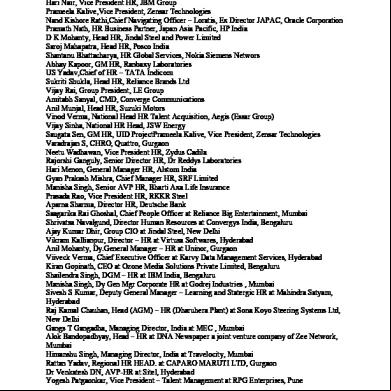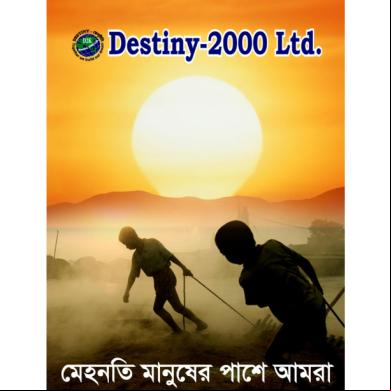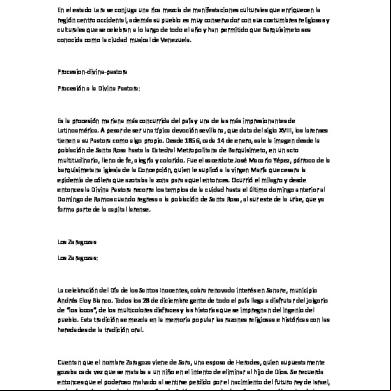"all Managers Are Hr Managers" - Gary Dessler 2g1j26
This document was ed by and they confirmed that they have the permission to share it. If you are author or own the copyright of this book, please report to us by using this report form. Report 2z6p3t
Overview 5o1f4z
& View "all Managers Are Hr Managers" - Gary Dessler as PDF for free.
More details 6z3438
- Words: 1,236
- Pages: 4
HR functions: Line versus staff authority “All managers are, in a sense, HR managers, since they all get involved in activities like recruiting, interviewing, selecting, and training.” -Gary Dessler Yet most firms also have a human resource department with its own human resource manager. How do the duties of this HR manager and his or her staff relate to "line" managers' human resource duties? Authority is the right to make decisions, to direct the work of others, and to give orders. In management, we usually distinguish between line authority and staff authority. Making decisions, directing work, Giving orders are authorities’ characteristics. Line Managers are authorized to direct the work of subordinates---they’re always someone’s boss. In addition, line managers are in charge of accomplishing the organization’s basic goals. For example, hotel managers and the managers for production and sales) Accomplishing goals and direct the work of subordinates Staff Managers, on the other hand, are authorized to assist and advise line managers in accomplishing these basic goals. HR managers are generally staff managers. They are responsible for advising line managers (like those for production and sales)in areas like recruiting, hiring, and compensation.(Assisting and advising line managers ) Line Manager’s HRM responsibilities We should know that HR managers are in most of the cases even now in this modern world generally staff managers. They are responsible for advising line managers (like those for production and sales) in areas like recruiting, hiring, and compensation. One major company outlined its line supervisors' responsibilities for effective human resource management under the following general headings: 1. Placing the right person on the right job 2. Starting new employees in the organization (orientation) 3. Training employees for jobs that are new to them 4. Improving the job performance of each person 5. Gaining creative cooperation and developing smooth working relationships 6. Interpreting the company's policies and procedures 7. Controlling labor costs 8. Developing the abilities of each person 9. Creating and maintaining departmental morale 10. Protecting employees' health and physical condition
In small organizations, line managers may carry out all these personnel duties unassisted. But as the organization grows, they need the assistance, specialized knowledge, and advice of a separate human resource staff. The human resource department provides this specialized assistance. Thus an HR manager will perform three distinct functions: 1. A line function. An HR manager possesses a line authority over his own department to
accomplish the task and roles assigned to each employees of the department. And since the majority of the decision is trickled down from the corporate level, he actually exudes such power. His suggestions also are taken as orders. 2. A coordinative function. An HR manager is also a coordinator of all the decision, activities in the personnel area. This is referred to as functional control. Whatever policies, procedures and objectives are set for the HR manager implements employees in the organization. 3. Staff functions. This is basically an advisory role played by the manager whereby he only assists line managers, but that does not mean his advice shall be taken finally. It all depends on the discretion of the line manager. Such a function involves assisting on areas such as, training, evaluating, rewarding, counseling, promoting, and firing of employees, etc.) many a times HR managers also update the line managers as well as top management regarding the current trends and new methods of solving problems. Thus we can conclude that there are certain areas, which are solely left on the Managers prerogative. While there are many areas where a kind of cooperative responsibility by both the HR manager and the line manager is required. Please refer to the table for the differentiation between each responsibility
Figure: Selected activities illustrating division of HR responsibility between line and staff:
Topic Recruitment selection
DEPARTMENT SUPERVISORS, (LINE) ACTIVITIES and Assist job analyst by listing specific duties and responsibilities of the job in question explain to HR future staffing needs and sorts of people needed to be hired. Descry” human requirements” of job so HR can develop selection tests. Interview candidates and make final selection decision.
Training and Orient employees regarding the development company and job and instruct and train new employees. Evaluate and recommend managers developmental activities. Provide the leadership and empowerment that builds effective work teams. Use the firm’s appraisal forms to appraise employee performance. Assess subordinates’ career progress and advise them regarding career option. Compensation Assist HR by providing information regarding the nature and relative worth of each job to serve as the basic for compensation decisions. Don the nature and amounts of incentives to be paid to subordinates. Decide on the package of benefits and services the firm is to pay. Labor Relations
Establish the day to day climate of mutual respect and trust needed to
PERSONNEL SPECIALISTS, ( STAFF) ACTIVITIES Write job description and job specification based on input from department supervisor Develop personnel plans showing promo table employees. Resources of qualified applications and engage in recruiting activities aimed at developing a pool of qualified applicants. Conduct initial serving interviews and refer feasible candidates to department supervisor. Prepare training materials and orientation documents and outlines. Advise CEO regarding development plan for managers based on CEO’s stated vision of firm’s future needs. Serve as resource for providing information regarding how to institute and operate quality improvement programs and team building efforts.
Develop performance appraisal tools and maintain records of appraisals. Conduct job evaluation procedures aimed at determining relative worth of each job in the firm. Conduct salary surveys to determine how other firms are paying the same or similar positions. Serve as a resource in advising line management regarding financial incentives and pay plan alternatives. Diagnose underlying causes of labor discontent with an eye toward
Employee Security safety
and
maintain healthy labor management relations. Consistently apply the of the labor agreement. Ensure that the firm’s grievance process is functioning in a manner consistent with the labor agreement and make final decisions on grievances after investigating same, Work with HR in negotiating the collective bargaining agreement. Keep the lines of communication open between employees and managers so employees are kept abreast of important company matters and have a variety of vehicles they can use to express concerns and use to express concerns and gripes. Sure employees are guaranteed fair treatment as it relates to discipline, dismissals and job security. Continually dire employees in the consistent application of safe work habits. Prepare accident reports promptly and accurately.
anticipating with the sorts of moral and lead to unionization efforts. Train line managers regarding the interpretation of contract and the legal pitfalls to be avoided during the union organizing effort Advice managers regarding how to handle grievances and assist all parties in reaching agree regarding grievances.
Advise line management regarding the communication techniques that can be used to encourage upward and downward communication. Develop an unfair treatment process and train line managers in its use. Analyze jobs to develop safe practice rules and advise on design of safety apparatus such as machinery guards. Promptly invest accidents analyze causes, make recommendations for accident presentation and submit necessary forms to occupational safety and health istration.
In summary, as Dessler remarks, “HR management is an integral part of every manager’s job. Whether you’re a first line supervisor, manager, or president, whether you’re a production manager sales manager, office manager, hospital , or HR manager, getting results through people is the name of the game.”
In small organizations, line managers may carry out all these personnel duties unassisted. But as the organization grows, they need the assistance, specialized knowledge, and advice of a separate human resource staff. The human resource department provides this specialized assistance. Thus an HR manager will perform three distinct functions: 1. A line function. An HR manager possesses a line authority over his own department to
accomplish the task and roles assigned to each employees of the department. And since the majority of the decision is trickled down from the corporate level, he actually exudes such power. His suggestions also are taken as orders. 2. A coordinative function. An HR manager is also a coordinator of all the decision, activities in the personnel area. This is referred to as functional control. Whatever policies, procedures and objectives are set for the HR manager implements employees in the organization. 3. Staff functions. This is basically an advisory role played by the manager whereby he only assists line managers, but that does not mean his advice shall be taken finally. It all depends on the discretion of the line manager. Such a function involves assisting on areas such as, training, evaluating, rewarding, counseling, promoting, and firing of employees, etc.) many a times HR managers also update the line managers as well as top management regarding the current trends and new methods of solving problems. Thus we can conclude that there are certain areas, which are solely left on the Managers prerogative. While there are many areas where a kind of cooperative responsibility by both the HR manager and the line manager is required. Please refer to the table for the differentiation between each responsibility
Figure: Selected activities illustrating division of HR responsibility between line and staff:
Topic Recruitment selection
DEPARTMENT SUPERVISORS, (LINE) ACTIVITIES and Assist job analyst by listing specific duties and responsibilities of the job in question explain to HR future staffing needs and sorts of people needed to be hired. Descry” human requirements” of job so HR can develop selection tests. Interview candidates and make final selection decision.
Training and Orient employees regarding the development company and job and instruct and train new employees. Evaluate and recommend managers developmental activities. Provide the leadership and empowerment that builds effective work teams. Use the firm’s appraisal forms to appraise employee performance. Assess subordinates’ career progress and advise them regarding career option. Compensation Assist HR by providing information regarding the nature and relative worth of each job to serve as the basic for compensation decisions. Don the nature and amounts of incentives to be paid to subordinates. Decide on the package of benefits and services the firm is to pay. Labor Relations
Establish the day to day climate of mutual respect and trust needed to
PERSONNEL SPECIALISTS, ( STAFF) ACTIVITIES Write job description and job specification based on input from department supervisor Develop personnel plans showing promo table employees. Resources of qualified applications and engage in recruiting activities aimed at developing a pool of qualified applicants. Conduct initial serving interviews and refer feasible candidates to department supervisor. Prepare training materials and orientation documents and outlines. Advise CEO regarding development plan for managers based on CEO’s stated vision of firm’s future needs. Serve as resource for providing information regarding how to institute and operate quality improvement programs and team building efforts.
Develop performance appraisal tools and maintain records of appraisals. Conduct job evaluation procedures aimed at determining relative worth of each job in the firm. Conduct salary surveys to determine how other firms are paying the same or similar positions. Serve as a resource in advising line management regarding financial incentives and pay plan alternatives. Diagnose underlying causes of labor discontent with an eye toward
Employee Security safety
and
maintain healthy labor management relations. Consistently apply the of the labor agreement. Ensure that the firm’s grievance process is functioning in a manner consistent with the labor agreement and make final decisions on grievances after investigating same, Work with HR in negotiating the collective bargaining agreement. Keep the lines of communication open between employees and managers so employees are kept abreast of important company matters and have a variety of vehicles they can use to express concerns and use to express concerns and gripes. Sure employees are guaranteed fair treatment as it relates to discipline, dismissals and job security. Continually dire employees in the consistent application of safe work habits. Prepare accident reports promptly and accurately.
anticipating with the sorts of moral and lead to unionization efforts. Train line managers regarding the interpretation of contract and the legal pitfalls to be avoided during the union organizing effort Advice managers regarding how to handle grievances and assist all parties in reaching agree regarding grievances.
Advise line management regarding the communication techniques that can be used to encourage upward and downward communication. Develop an unfair treatment process and train line managers in its use. Analyze jobs to develop safe practice rules and advise on design of safety apparatus such as machinery guards. Promptly invest accidents analyze causes, make recommendations for accident presentation and submit necessary forms to occupational safety and health istration.
In summary, as Dessler remarks, “HR management is an integral part of every manager’s job. Whether you’re a first line supervisor, manager, or president, whether you’re a production manager sales manager, office manager, hospital , or HR manager, getting results through people is the name of the game.”










